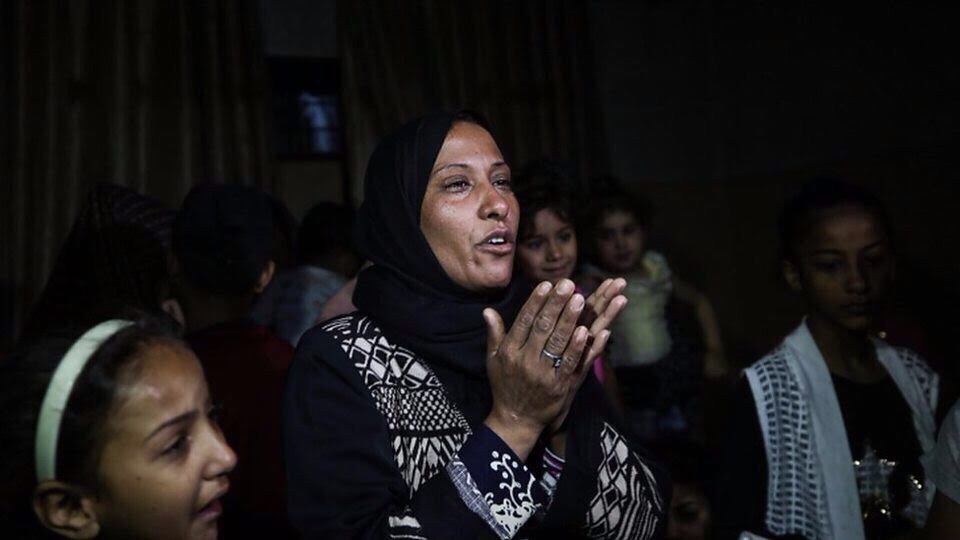 Gaza violence: Israelis and Palestinians in fierce exchanges at UN
Gaza violence: Israelis and Palestinians in fierce exchanges at UN▪ 15 May 2018 Middle East
The BBC's Middle East editor Jeremy Bowen sent this report from Gaza
There have been angry exchanges between Israeli and Palestinian envoys at the UN, as the diplomatic fallout over deadly violence in Gaza gathered pace.
Some 58 Palestinians were killed when Israeli troops fired on protesters on Monday, with funerals held on Tuesday.
The Palestinian envoy spoke of a "crime against humanity", while Israel accused Hamas, who are in control of Gaza, of taking their own people hostage.
This week was the culmination of a six-week protest against Israel.
Monday was the 70th anniversary of the founding of the state of Israel and also the day the US made the controversial move of its embassy from Tel Aviv to Jerusalem.
What have Israel and the Palestinians said?
The emergency meeting of the UN Security Council began with its president, Poland's Joanna Wronecka, calling a minute's silence for those killed in Gaza on Monday, along with "others who have died as a result of a conflict that has endured for far too long".
After a number of nations expressed concern at the violence and some called for an inquiry, the Palestinian and Israeli envoys engaged in a fierce exchange.

Image caption
Riyad Mansour speaks at the UN amid a strong difference among speakers to the council
Palestinian UN envoy Riyad Mansour said: "We condemn in the most emphatic terms the odious massacre committed by Israel in the Gaza Strip."
He called for a halt to Israel's military operations and a transparent international inquiry into what he said was a "brutal Israeli attack on Palestinian people who expressed their resistance".
He said it was "a war crime, a crime against humanity".
Mr Mansour criticised the UN for not pursuing inquiries in the past, saying: "How many Palestinians have to die before you take action? Did they deserve to die? Did children deserve to be taken away from their parents?"
Danny Danon, the Israeli envoy to the UN, said the events at the border "were not demonstrations, they were not protests, these were violent riots".
He said that Hamas had "taken the people of Gaza hostage".
"They incite people to violence, place as many civilians as possible in the line of fire to maximise civilian casualties, then they blame Israel and come to the UN to complain. It is a deadly game they play at the expense of innocent children."
He added: "When they say day of rage they mean day of terrorism; right of return means the destruction of Israel; peaceful protest means incitement and violence."
What have other nations said?
▪ Speaking at the UN, US ambassador Nikki Haley defended the level of Israel's use of force, saying: "No country in this chamber would act with more restraint than Israel has." She said the US "deplores the loss of human life" but laid blame on Hamas, saying: "Make no mistake, Hamas is pleased with the results from yesterday"
▪ Germany, the UK, Ireland and Belgium all called for an independent inquiry. UK ambassador Karen Pierce said: "The volume of live fire used in Gaza yesterday, and the consequent number of deaths is distressing and cannot be ignored by the council"
▪ Ireland summoned the Israeli ambassador to express its shock
▪ Turkey told Israel's ambassador to temporarily leave. Israel did the same to the Turkish consul in Jerusalem
▪ French President Emmanuel Macron told Israeli PM Benjamin Netanyahu in a telephone call that civilians had the right to protest peacefully
Kuwait is preparing a draft document aimed it said at "providing international protection for civilians".
What happened in Gaza on Tuesday?
Funerals were held for the 58 Palestinians killed on Monday. About 2,700 were also injured, Palestinian officials said.
Two further deaths were reported on Tuesday, but despite fears of renewed violence, calm mostly prevailed as the dead were buried.
Monday and Tuesday's events came after a six-week protest called the "Great March of Return".
Monday was the anniversary of the creation of Israel while Tuesday marks the day Palestinians call "Nakba", or "catastrophe", which commemorates the more than 700,000 Palestinians who fled or were expelled from their homes following its foundation.
Monday also marked the opening of the US embassy in Jerusalem, a move that has incensed Palestinians.
Palestinians claim East Jerusalem as the capital of a future Palestinian state and see the US move as backing Israeli control over the whole of the city - which Israel regards as its indivisible capital.
On Tuesday, Palestinian Authority President Mahmoud Abbas recalled his envoy to Washington, Saeb Erekat, in protest at the embassy move.
More than 100 protesters have been killed and thousands injured by Israeli fire during the six-week protest.

Image caption
The BBC's Jeremy Bowen explains why people have been protesting in Gaza
At Shifa, Gaza's main hospital, men were queuing on Tuesday to give blood. They wanted to help the many wounded in Monday's violence.
Inside the hospital, there were many with gunshot wounds. Across Gaza, families were burying their dead. By midday there were no reports of new demonstrations.
There was shock in Gaza at the scale of the killing. The right of return to lands they lost is a highly emotional issue for Palestinians but people here questioned whether it was worth staging such a protest after the terrible death toll.
In fact, this was an incident waiting to happen. Tension has been rising for weeks in Gaza. People here have been impoverished by a goods blockade imposed by Israel and by Egypt, which shuns Hamas because of its links with the Muslim Brotherhood.
The only way of stopping more violence and death is to work seriously to settle the conflict. But that is not happening.
No comments:
Post a Comment